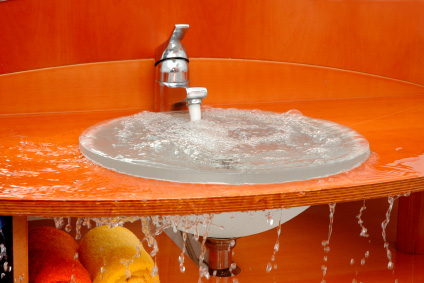Open House. Open House on Saturday, May 30, 2015 12:00 pm - 2:00 pm
New property listed in Ranch Park, Coquitlam
Open House. Open House on Saturday, May 30, 2015 2:00 pm - 4:00 pm
How to Protect Your Home from Water Damage
We all protect our home from fire and smoke, but what about water damage? The Home Insurance experts at BCAA offer eight excellent tips to avoid a costly mess
Water damage is one of the most common and costly challenges facing BC homeowners. The frequency and severity of water damage claims continue to grow due to extreme weather, more complex appliances and the growing popularity of condensed multi-unit living.

Most insurance policies do not cover water damage caused by continuous or repeated seepage, rising ground waters or surface waters – but sudden, while accidental, escape of water from a watermain, plumbing, heating system or internal drain are usually covered. Water damage resulting from a private external drain or entry of water through an opening in your roof are usually not covered and depend on your policy; additional coverage can be purchased for either event to provide you with protection needed.
A few simple precautions can help to safeguard your home and possessions from water damage:
Install water alarms. They work like smoke detectors but warn of leaks from toilets, water heaters, overflowing baths and sinks. Simply place near any water source and a high-pitched alarm alerts you to water leaks. Water alarms start from as little as $15 a unit.
Install stainless steel-braided hoses where possible. These hoses cost around $20 and are less likely to deteriorate than plastic hoses. Dishwasher and washing machine hoses should be inspected and replaced every three to five years.
Use a rain barrel. Rain barrels keep rainwater out of overloaded storm sewer infrastructures and provide you with water for your garden. Check if your municipality has a program that offers subsidies for a rain barrel purchase.
Connect an eavestrough downspout extension. Extend the eavestrough at least six feet from foundation walls to prevent water from draining into your basement, and direct it towards the street. Downspout extensions cost around $15.
Check the foundation. As ice melts or after heavy rain, clear any pooling water away from the home.
Inspect the roof. Get the roof inspected every few years to check the condition of the shingles and replace when necessary in order to prevent leaks.
Test the sump pump. If the basement has one, examine it and conduct a test run especially if it doesn’t get used frequently.
Protect your valuables. Consider moving valuables away from high-risk areas, such as the basement, or place items on high shelves or risers, especially in homes prone to water damage.
I have sold a property at 403 200 NEWPORT DR in Port Moody
Open House. Open House on Sunday, May 24, 2015 2:00 pm - 4:00 pm
Open House. Open House on Saturday, May 23, 2015 2:00 pm - 4:00 pm
Realtors Hike on Thursday May 28th!!
Meet me at the Deer Lake Trail in Burnaby!!

New property listed in Silver Valley, Maple Ridge
How to downsize your home
Moving to a smaller place? Over time, we tend to accumulate stuff - lots of stuff. We have drawers full of stuff, gifts that we have never used (and never will), furniture we don’t really need but keep “just in case” and items that we’ve had for years may be difficult to part with due to nothing more than familiarity while serving no functional purpose. Now is the time to get rid of excess baggage (literally!) and pare down to the essentials.

Deciding what you really need requires a good long look at how you live your life daily and prioritizing the activities and items that are already a part of your actual lifestyle--not those activities or items that you wantto be part of your lifestyle, but haven't gotten around to yet.
- Take a walk through your house or apartment and evaluate everything you come across (furniture, books, food, etc.). Ask yourself if you've used it in the past year and, if so, how often? Be honest with yourself. If you think you could live well without it, out the door it should go. Make a note of it.
- Consider that most of the stuff people keep without using is a tribute to an unmet goal. The most common example is probably exercise machines that we always say we'll use, but don't. Then there are those books we intend to read, that table we eventually want to have dinners and brunches on, etc. We keep things around "just in case", or hoping that their presence will eventually encourage us to use them. But let's be realistic, if seeing that treadmill get a coating of dust hasn't inspired you yet, what makes you think it ever will? Make room for the things you'll actually use.
- For stuff that you really have a hard time getting rid of, make this agreement with yourself: Put the items in storage. If you don't need or use them within 6 months, give, sell or throw them away.


You will also need to get the room measurements of your new space. Ask if you can take measurements or if there is a floor plan available to you. Don’t forget about the location of doors and windows as this will be a factor in furniture placement. Once you have these measurements, make a floor plan using your furniture’s measurements. Try using Better Homes and Gardens’ Arrange-A-Room online software to simplify the process (requires registration but is free). This will give you a much better idea on what you can keep and what will have to go.

Assessing exactly how much of the new space is dedicated to storage will give you and idea of the volume of items you need to dispose of before moving in. Don’t forget hidden storage areas you currently use in your old place. If you place a lot of items above the kitchen cabinets in your current home, for example, find out if the cupboards in the new place have storage in that area as well.

- Don’t forget to go through your bathroom cabinets, kitchen and “junk” drawers. We have a tendency to accumulate unnecessary items in these places. Get rid of empty bottles, balls of twine, expired medicines and beauty products, and your collection of plastic margarine containers. Be brutal.
- How you dispose of these unnecessary items will depend on how much energy and/or time you have. The easiest thing to do is to load them up on a truck and drop them off at the nearest thrift shop.
- Join a Freecycle group to give stuff away (www.freecycle.org)
- If you live in an apartment building or townhouse complex, notice boards and drop off areas for giving unwanted items to neighbours is sometimes provided.
- Call up your friends and relatives and see what they need. You may be able to enlist their help in the move for a promised dresser/bed/armchair!

- For a large number of items, have a yard sale (or a series of yard sales), or if you have a lot to sell quickly, consider a service to take care of it for you (e.g., Google liquidation estate content sales).
- If you have time before the move, utilize sites such as Craigslist and eBay to sell off the best stuff. You’ll likely get more money for your items this way but it is more time consuming.
- Craigslist is a good avenue for selling larger items such as furniture, appliances and home decor items to people living in your area. If you have the means, offering delivery will often produce quicker sales.
- eBay is a good venue for selling collectible items such as old albums, comic books, and figurines. Make sure to take good quality photos of the items and offer good descriptions. Remember that you are a salesperson. Sell those products!
- Used designer clothing can be resold in consignment shops. These stores can be found in your local business directory. Be sure to shop around. Some stores offer better rates than others.






Unique #investment opportunity in #Chinatown!!

Everything is close by, you don't need a car.








